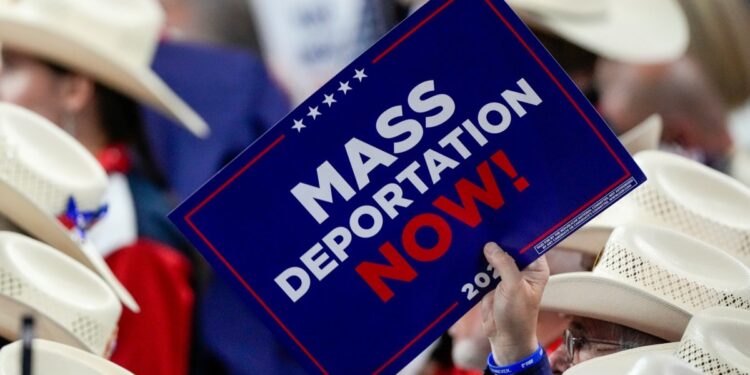During the ABC News presidential debate on Tuesday night, Donald Trump invoked over and over the issue he believes will win him the November election: immigration.
That meant a deluge of disparaging comments about migrants. He falsely claimed they are “pouring into our country from prisons and jails, from mental institutions and insane asylums”; he said immigrants coming in are “at the highest level of criminality.” Trump couldn’t even stop himself from repeating the unspeakably racist lies about Haitian migrants in Springfield, Ohio eating domestic pets. (The final of these led to a bizarre interaction: The moderators fact-checking the former president’s claims of animal eating as Trump interrupted to say “people on television say my dog was taken and used for food.”)
But, when it came to the framing of immigration, Trump did ultimately have the last word on the debate stage—both literally and figuratively. Just before the head-to-head came to a close, the former president used his final remarks to define the issue on his own perverse terms: “What these people have done to our country, and maybe toughest of all, is allowing millions of people to come into our country, many of them are criminals, and they’re destroying our country,” he said.
The entire debate about immigration, to the extent it even happened, existed within Trump’s harmful idea. The only political points made on immigration on stage were about enforcement.
Vice President Harris hinted at an agenda focused on border enforcement and reviving a now-defunct sweeping bipartisan Senate immigration bill that would have added 1,500 border patrol agents to the force and raised the standards for asylum claims. That proposed legislation, which the Biden administration described as the “toughest” border enforcement measure in decades, has somehow become synonymous with compromise on immigration, despite doing little to advance Democrats’ long-standing promises of legalization for undocumented populations. (Trump torpedoed the bill to avoid handing Democrats a victory on a seemingly intractable issue.)
Trump’s misleading generalizations about “migrant crime,” went largely unchallenged—both by Harris and the media. At times, they were even reinforced. In reactions to JD Vance’s post-debate defense of Trump’s Springfield lies, CNN commentators eagerly pushed back on criticism that the media hasn’t been covering isolated incidents of migrants perpetrating violence. “There have been all kinds of stories and all kinds of coverage of immigrant crime and every state is a border state,” Chris Wallace said. (He did not note that data shows immigrants commit crimes at lower rates than US citizens.)
On stage, Trump didn’t have to account for how he would carry out his potentially catastrophic and inhumane plans to mass deport millions of undocumented immigrants from the United States. He just ranted about “millions of criminals” and “terrorists” entering the country to vote for Democrats. Nor did Trump answer why he killed a bipartisan deal that would have delivered on Republicans’ wishlist of border restriction measures without providing a path to legalization for the undocumented. Instead, he evaded the question by disputing Harris’ dismissal of his rallies’ crowd before shifting to pet-eating-immigrants.
It should go without saying that the contrast between Harris and Trump on all things, including if not especially immigration, is as clear as day. For one, she’s not proposing building sprawling detention camps to hold thousands of immigrants or vowing to use the military to police the border. But when given the opportunity to further stress that distinction to her advantage, Harris didn’t take it. She didn’t call out Trump’s mass deportation plot or challenge his repeated assertions that migrants commit crimes and represent an existential threat to the United States.
When asked about the Biden administration border policies, Harris—who has a proven track record of advocating for immigrants—instead defaulted to putting on her prosecutorial hat and linked immigration to criminality by touting her experience tackling “transnational criminal organizations for the trafficking of guns, drugs, and human beings.” To attack Trump for tanking the bipartisan border deal, Harris said, “he preferred to run on a problem instead of fixing a problem.”
Given the current state of the immigration debate, that may as well be the safer strategy when it comes to such a polarizing issue. But advocates and immigrant rights groups have long disputed the notion that immigration is inherently a liability for the Biden administration—and by proxy Harris—urging them to adopt an unapologetically pro-immigrant stance and go on the offensive against Republicans’ xenophobic agenda.
Ahead of the debate, I spoke with Michelle Ming, political director at the immigrant-youth led United We Dream network. On Monday, the organization’s political and electoral arm endorsed Harris, saying in a statement the goal is to block another Trump presidency and prevent mass deportations. “We know the fear that our communities lived with under his presidency, and just the uncertainty of making it through another day in this country without being rounded up, deported or arrested,” Ming said. “We feel deep in our bodies this understanding that we can’t go back to that, our communities can’t survive another four years of that.”
Still, that doesn’t mean they wholeheartedly approve of Harris. “I think what Kamala Harris needs to do is get up there and really make herself stand apart from Trump, rather than trying to be more Republican than Trump on immigration, which is, frankly, something that it feels like she’s trying to do right now, or that the Democrats are telling her to do,” she added. “That’s not a winning strategy.”







